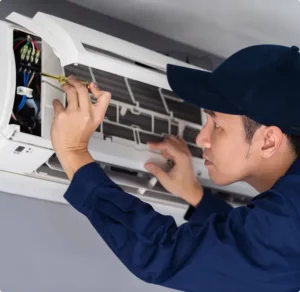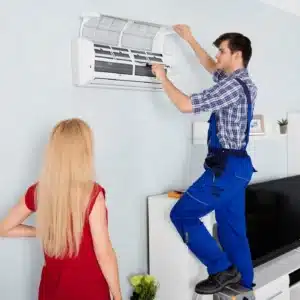Signs Your AC Needs Repair
In Florida’s sweltering heat, a reliable air conditioning system is...
The significance of indoor air quality (IAQ) cannot be overstated. In this blog post, we’ll cut through the fluff and get straight to the facts about why improving indoor air quality is a practical and essential investment for homeowners and businesses alike.
The most straightforward reason to improve indoor air quality is the direct impact it has on human health. Poor IAQ can lead to respiratory issues, allergies, and other health problems. By reducing the concentration of airborne pollutants, you create a healthier living or working environment, minimizing the risk of respiratory conditions and improving overall well-being.
For businesses, investing in improved indoor air quality is an investment in productivity. Numerous studies have demonstrated a direct correlation between air quality and cognitive function. Employees working in well-ventilated, clean environments tend to be more focused, alert, and productive. A small investment in IAQ can yield significant returns in terms of workforce efficiency.
Individuals with allergies or asthma are particularly sensitive to indoor air pollutants. Improved IAQ helps manage and reduce the triggers for these conditions, providing relief to those who suffer from respiratory ailments. Clean air is an essential component of a comprehensive strategy for allergy and asthma management.
While the initial investment in enhancing indoor air quality may seem like an added expense, it can lead to substantial long-term cost savings. Clean air reduces the likelihood of respiratory illnesses, decreasing medical expenses. Additionally, a well-maintained HVAC system operates more efficiently, resulting in lower energy bills and fewer repair costs.
Indoor air quality doesn’t just affect human health; it can also impact the longevity of your property. High humidity levels, mold growth, and indoor pollutants can damage building materials and contribute to the deterioration of your home or office. Investing in IAQ is, therefore, an investment in the preservation of your property.
For businesses, adhering to indoor air quality regulations is not just about compliance; it’s also about maintaining a positive reputation. A commitment to providing a healthy environment for employees and customers reflects positively on your brand. It can also help avoid potential legal issues associated with poor IAQ.
Improving indoor air quality is not a luxury; it’s a practical necessity. The health benefits, increased productivity, cost savings, property preservation, and regulatory compliance are compelling reasons to prioritize IAQ in your home or business. If you’re ready to take the practical step towards cleaner air, contact a skilled HVAC company for expert advice and solutions tailored to your specific needs. It’s an investment that pays off in the health and well-being of occupants and the long-term sustainability of your property.

In Florida’s sweltering heat, a reliable air conditioning system is...

In Florida’s hot and humid climate, HVAC systems are essential...

Florida’s warm climate brings many advantages, but it also means...

When it comes to keeping your home comfortable in Florida’s...

In Florida’s hot and humid climate, a reliable air conditioning...

If your air conditioner has been chugging along since the...